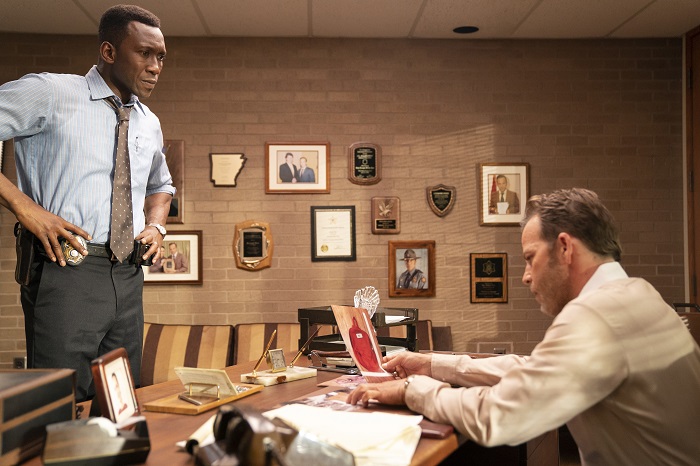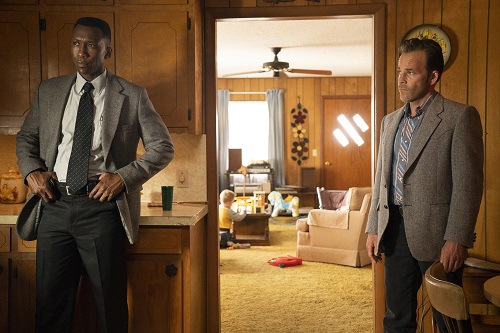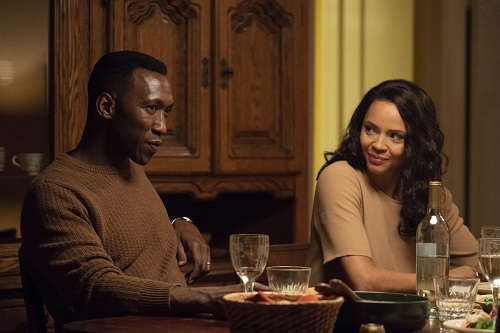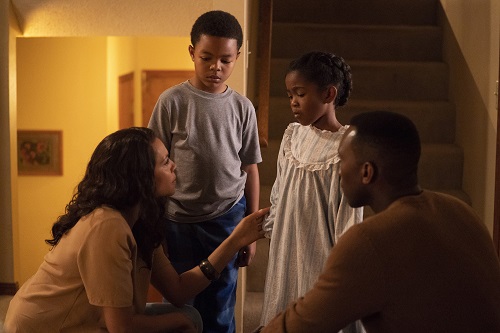By Roxana Hadadi | TV | February 4, 2019

“You need help killing time? I’m your man. I come up with ways to kill time ain’t nobody ever thought of. … But I don’t want to dip so much as a toe back in that shit.”
What did Wayne Hays and Roland West do back in 1990? There are so many unanswered questions in this season of True Detective, but during this fifth episode, “If You Have Ghosts,” the question of what happened to little Julie Purcell takes a bit of a backseat. Instead, the focus here is on Hays and West, on their actions in 1990, and what caused their 24 years of separation. Who did they piss off? What did they uncover? Who did they kill?

Their conversation in 2015 puts some pieces together: First, I think back in 1990 they found Lucy’s cousin Dan O’Brien, killed him, and dumped his body in the quarry; I think this is what Amelia’s voice was reminding Hays of when she spoke to him in the third episode “The Big Never” about what he “left” in the forest. Why Hays and West killed him, I’m not sure, but I do think that is at least one death they were involved in. Second, I think they’re responsible for the disappearance—and probably the killing—of the police officer that Elisa mentions in 2015, Officer Harris James, who was there when Will’s supposed backpack was recovered from the floorboards of Brett Woodard’s home. The white man we see in the suit standing among the Viet Cong, in Hays’s memories in fourth episode “The Hour and the Day”? I think that’s Harris, with a bullet wound to his chest. But again, why? What did Hays and West uncover back in 1990 that involved them in the deaths of at least two men?
And what did Hoyt, the man behind Hoyt Foods who in 1980 was “on safari” and couldn’t meet with the detectives when they came to his chicken factory, say to Hays back in 1990? This is a conversation that West didn’t know about, but that Hays divulges to him in 2015:
“He came to see me, day after what happened—Hoyt.”
“What? You never told me that.”
“I made a decision. Yeah. Had other things to think about, including a family. I let it go. He knew about what we done. Seemed like he was in the dark on some stuff, too.”
What did Hoyt know? Was he involved in Julie’s kidnapping? Was he Julie’s biological father? Was he involved in Lucy’s death by OD in Las Vegas in 1988? Dan O’Brien was in Vegas in 1987—is he connected to this somehow, too?
Shifting the focus to Hoyt seems to abandon other plot threads, like the interracial couple with the brown sedan, or the black man with the filmy eye, or the “aunt” that Julie mentioned at church, or the missing set of fingerprints from the 1980 case file that Hays revisits in 1990; are they all red herrings? Or is all of this somehow still connected? Hays says to West of his involvement with the true-crime documentary, “If I remember what we done, I’ll remember not to say,” but I’m going to go ahead and doubt that line very damn much.
Anyway, some notable plot developments from this episode:
In 1980:
• The shootout with Brett Woodard was efficiently violent and horrendously upsetting, extremely reminiscent of a similar scene in Jeremy Saulnier’s Hold the Dark and equally complicated in terms of guiding motivations: Who is at fault here? Is it only Brett? Is it only the racists who attacked him and made him feel so unwanted in their town? Is it the police, or Hays and West (who we see getting shot, answering the questions in 1990 about his limp), who didn’t do enough to protect him from the town’s suspicions? Probably yes to all of those, and the shot of Woodard’s body slumped against with wall, with the bloody soles of his feet sticking out, made me very upset indeed. Michael Greyeyes wasn’t in very much of this season, but he certainly left an impression.

• I’ve wondered what drew Amelia and Hays together back in 1980, and what would create enough of a bond between the two of them that they would want to get married despite being so seemingly different from each other, and it seems like we get our answer when she comes to the hospital to see Hays after the shootout. Covered in West’s blood, frustrated with having to give the same statement over and over again to two disinterred white cops, Hays makes a move on Amelia, more confidence in his “You wanna get out of here?” than during any moment of their first date. They’re each aroused by danger, and by pretending to be other people, but that can’t last very long. We see that in 1990: There’s too much resentment between them, and they’re each too tired. Becca may remind her parents that the family tells each other to never go to bed without saying “I love you,” but that didn’t mean the fight Amelia and Hays were having was truly over. It’s still haunting Hays 25 years later.
OK, so let’s use that scene to transition to 1990:
• So, that call: Is that really Julie Purcell? This is her side of the conversation with the dispatch:
“I saw him on the television. Leave me alone. Make him leave me alone. That’s not my real name. Tell him to leave me alone. I know what he did. The man on TV acting like my father! Where’s my brother? Will. I don’t know what he did with him. We left him resting. Tell him to leave me alone. It—he took me, and I’m never coming back. Just leave me alone.”
But: Is that really Julie? The boy that Hays and West speak with mentions knowing a girl who went by Mary July and was probably Julie, who spoke of being separated from her brother, who was convinced that she was a “princess” from the “pink rooms” (think of Julie’s drawings that Hays found in the Purcell home). Was she being groomed before she was taken? Was she told Tom wasn’t her father? Did whoever took her also abandon her? Why is she alone, and what does she think that Tom did?
• Also in 1990, that teenager Freddy Burns is now married with a house and a kid and what seems like a steady but dead-end mechanic job, and he blames Hays for how his life turned out, which, buddy, at least you seem to own property! Barely any late-20-something I know in 2018 has been able to manage that feat! But he gives Hays and West another tidbit about his altercation with Will Purcell that night: “I can’t find my sister, I don’t know where they went,” the younger boy said. So did he actually get separated from Julie, and then somehow someone else found and killed Will? Were there two people involved in this crime? And if so, why would Julie on the phone call mention being separated from her brother but then also mention leaving him in that cave? Would one be more meaningful to her than the other? Is that really Julie Purcell?
Finally, in 2015:
• Is Roland West in self-imposed exile in 2015, more than two decades since he’s seen or spoken with his former partner? What he shares about himself seems to be in direct opposition to what Hays remembers—no wife, no children, just many dogs for BFFs—and yet the two men fall back into the same rhythm almost immediately. “You looking good, Purple! Who’s that old man with you?” is some of West’s customary charm, but it’s clear that there is a grudge between the two that Hays can’t remember. I didn’t expect to be moved by West’s “Never said you’re fucking sorry once,” but I teared up, so here we are!
• So: What did Hays do to piss West off so much? Hays alludes to whatever happened between him and Hoyt as a sort of explanation, but there are obviously pieces missing from his narrative. And West makes it seem like Hays just totally walked away from the job, and his “Half the cases you ever worked never closed. You quit the job. I was there” could be taken either literally or figuratively, right? Did Hays just give up? Why?
• I think West’s admission that “those TV people” called him too may puncture the theory that the documentary is something Elisa and Ray came up with for Hays in particular. If they were also reaching out to Roland, then that adds some more legitimacy to it, right? But also, who is funding this? And what are their motives?

• Hays shares with West that he thinks Lucy wrote the letter to the Purcells, about how “children should laugh,” after he reads Amelia’s exchange of her conversation with Lucy in her book, Life and Death and the Harvest Moon. (What I guessed at during last week’s recap!) That was a smart way to reconcile different narratives that we’ve seen play out that don’t seem to intersect—what else will Hays realize that Amelia was involved in? Does all this close the door on the theory that she may have been involved in the children’s disappearance, or keep it open?
• The Hays/West meeting ends with a team-up, right? But interesting how they phrase it: Hays tries to appeal to West’s desire for adventure with “Come on, stir some shit up with me,” but it looks like West is plagued by guilt in a way that Hays can’t be because of his dementia. That line isn’t going to fly with him. Instead, his response is the world-weary “Well, I could use a laugh,” as if he knows that everything the men are about to do is in vain. Why go along with it? Maybe because like Rust Cohle said back in season one, sometimes you need bad men to keep other bad men from the door.
And some odds and ends:
+ Please give Scoot McNairy an award for Tom’s collapse after he sees the picture of Lucy’s body after she overdosed, and THEN when he broke down all over again after Hays showed him the picture of the young woman who might be Julie. Even without the grief mustache, Scoot is compelling as hell! (I also like Dorff’s delivery of West’s “Try to forget it,” which is one of those things you say to someone that you know they will never, ever listen to. Also remember: Although we saw the burned-down Purcell house on Shoepick Lane, we haven’t yet seen Scoot in 2015. Is he still alive?)
+ In 1990, Hays seems particularly resentful of the fact that he had to kill Brent Woodard, telling the former prosecutor who is now representing Woodard’s children “Motherfucker made me carry his water. Like I need more of ‘em memories.” But I’m curious as to why we haven’t seen yet seen Woodard as one of the figures haunting Hays in 2015. We’ve seen Amelia, the Viet Cong, and the mystery man that I think is Officer Harris James. But why not Brett?
+ The best dialogue in the whole season so far is this exchange between Elisa and Hays during filming:
“A lot of people around this thing are dead. A lot of people gone.”
“People do that, miss. Most people I ever knew are gone.”
A close second, though, is Hays and Amelia during their post-dinner fight:
“Ten years and you never got me right.”
“You never got yourself right.”
Was that fight otherwise quite repetitive, treading the same ground about the issues in their marriage? Yes and yes.
+ OK, I LIED. I’M SORRY, THIS WAS THE BEST LINE OF DIALOGUE: “Please explain to me all the hardships and tribulations of being a white man in this country.”
+ In 2015, Hays runs through his house, trying to find his family, and slowly opens a bedroom door; in 1990, the door seems to open on its own, while Hays lays next to his family in bed. What is up with that? A time loop? Just a creepy moment Nic Pizzolatto wanted to add in during the second episode he directed this season? I thought it was a good effect, but not one that particularly holds up narratively.
+ Seriously, though, when Stephen Dorff was appearing in Britney Spears music videos, I was not aware of the gravity he could give a line delivery like “You don’t judge me, motherfucker. I know you. I know what you did. What I did”!
How wrong I was! I should have judged you by Sofia Coppola’s Somewhere, Stephen, not Everytime! My apologies!